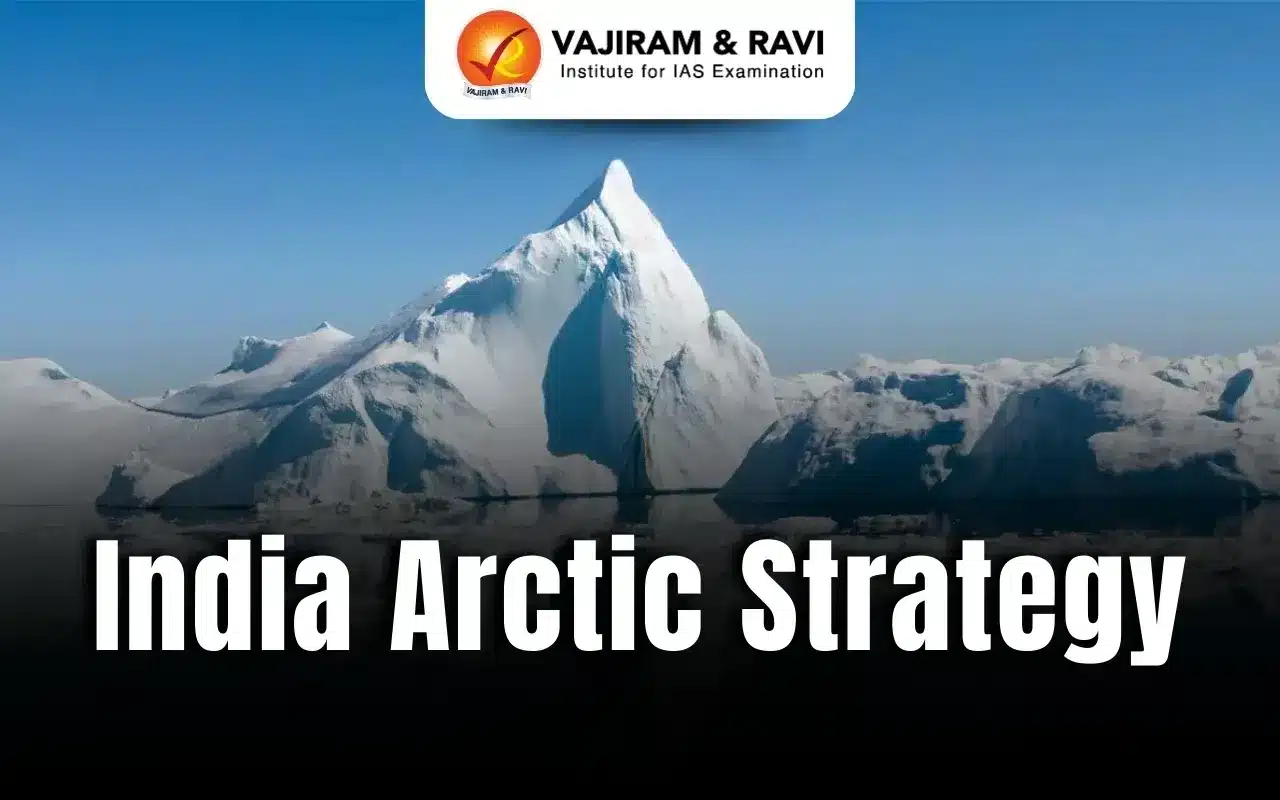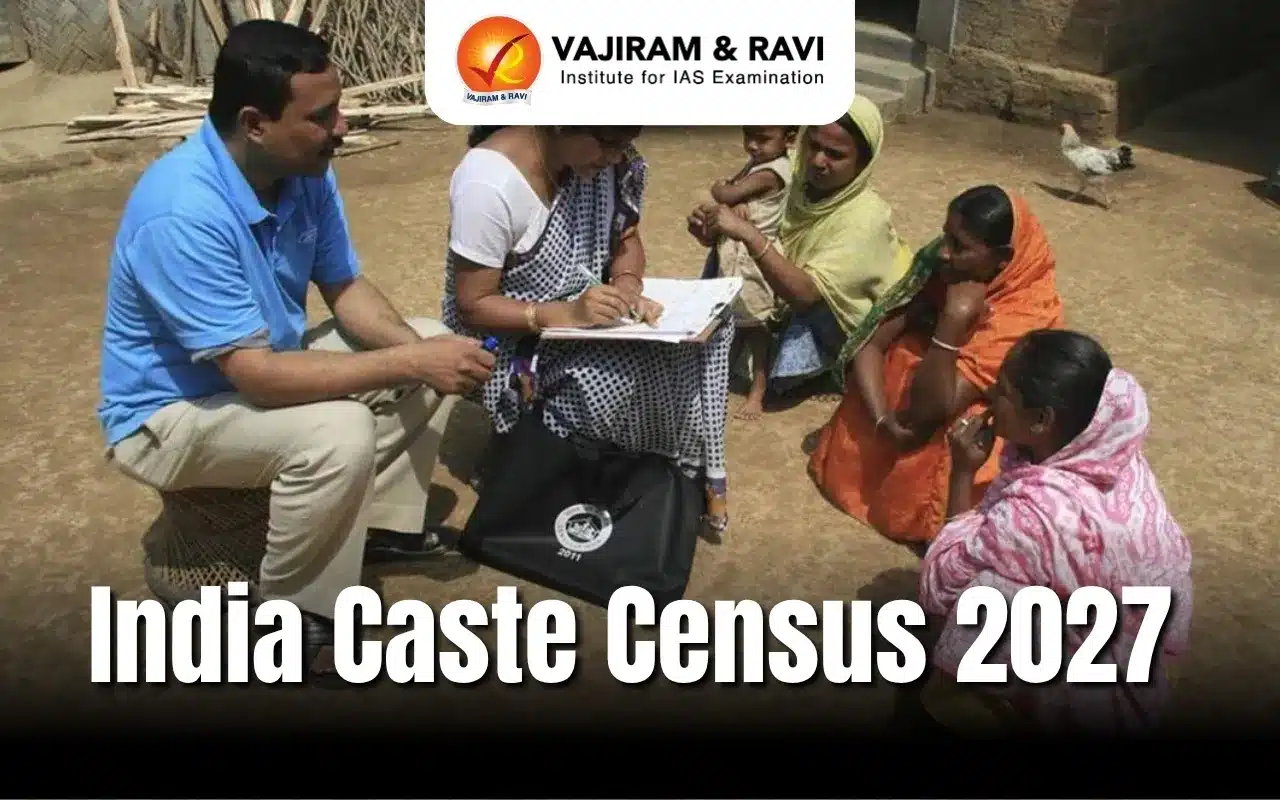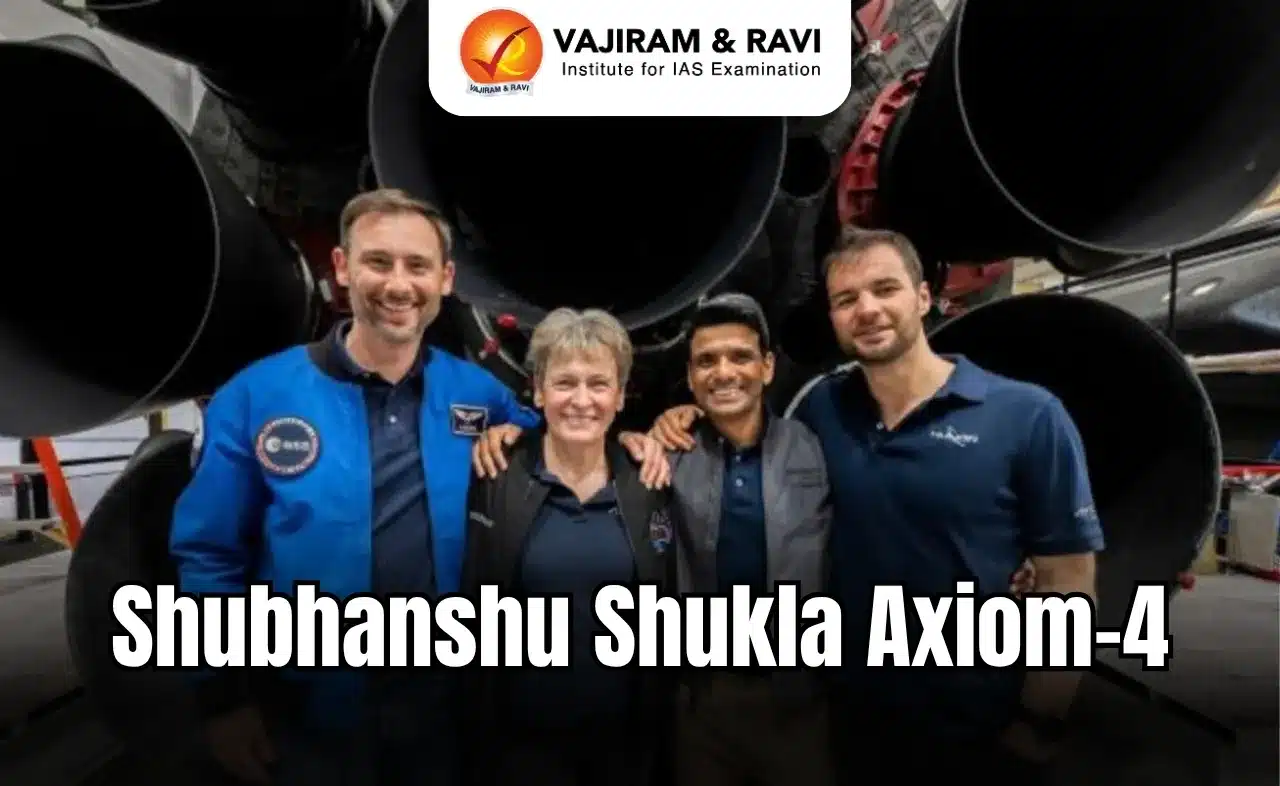What’s in Today’s Article?
- India Arctic Strategy Latest News
- India’s Strategic and Economic Interests in the Arctic
- India-Russia Relations in the Arctic
- India’s Role as a Stabilising Factor in the Arctic
- India Arctic Strategy FAQs
India Arctic Strategy Latest News
- Speaking at an India-Russia Arctic conference, Russian Ambassador to India emphasized India’s growing role in the Arctic as a stabilizing force amid rising militarization by NATO countries.
- The conference was organized by Vivekananda International Foundation and The Northern Forum of Russia.
India’s Strategic and Economic Interests in the Arctic
- India’s 2022 Arctic Policy takes a whole-of-government approach, focusing on climate, economy, and governance.
- However, it overlooks rising militarization and great power rivalries.
- To safeguard long-term strategic interests, India must incorporate a seventh pillar addressing geopolitical dynamics.
Economic Opportunities in the Arctic
- The melting Arctic ice is reshaping global shipping routes.
- While the Northern Sea Route (NSR) offers limited advantages for India, linking the International North-South Transport Corridor (INSTC) with Russia’s Unified Deep-Water System (UDWS) could reduce costs and stimulate hinterland development.
- Additionally, the Chennai-Vladivostok Eastern Maritime Corridor aims to integrate with the NSR, potentially cutting travel time to Europe by two weeks.
Countering China’s Expanding Presence
- China is aggressively investing in the Russian Arctic, particularly in energy and infrastructure, under its Polar Silk Road initiative.
- With a US$10 billion investment, China’s growing presence threatens India’s strategic and economic interests.
- Collaborating with Russia on the NSR can counterbalance China’s dominance, secure India’s energy supply, and prevent Russia from becoming overly reliant on China.
Navigating Geopolitical Dynamics
- The Arctic is becoming a strategic battleground, with China asserting itself as a “near-Arctic state.”
- While India’s policy emphasizes sustainability, it must also strengthen strategic autonomy through diversified partnerships.
- By engaging in Arctic affairs, India can protect its energy security and assert influence in a multipolar world order.
India-Russia Relations in the Arctic
- India’s growing interest in the Arctic’s hydrocarbon and mineral reserves is closely tied to its partnership with Russia.
- With 50-55% of the Arctic’s coastline under Russian jurisdiction, India has invested $15 billion in Russian oil and gas projects, securing its economic and strategic foothold in the region.
Strengthening Bilateral Trade and Arctic Cooperation
- At the 22nd Indo-Russia Summit, both nations committed to intensifying trade and investment, especially in the Russian Far East and Arctic zones.
- A joint working body within IRIGC-TEC has been established to enhance collaboration on the Northern Sea Route (NSR).
- They also set a goal to increase bilateral trade to $100 billion by 2030.
Geopolitical and Energy Security Implications
- As global power shifts towards Asia, India-Russia cooperation in the Arctic is becoming increasingly vital.
- Russia controls 80% of Arctic oil and gas reserves, while India seeks reliable energy sources for its growing economy.
India’s Role as a Stabilising Factor in the Arctic
- Russian Ambassador Denis Alipov emphasized India’s constructive approach in the Arctic, contrasting it with NATO’s militarization and unilateral policies, which have disrupted Arctic Council activities since 2022.
- He reaffirmed Russia’s support for India’s growing presence in the region and its commitment to joint scientific, environmental, and commercial initiatives.
India-Russia Scientific Collaboration in the Arctic
- Alipov highlighted areas of bilateral research cooperation, including climate change, atmospheric studies, geosciences, glaciology, and polar biology.
- Indian scientists are also studying the Arctic’s influence on South Asian monsoons.
- Institutions like the Arctic and Antarctic Research Institute (Russia) and the Indian National Centre for Polar and Oceanic Research are actively collaborating, supported by a 2024 memorandum on Arctic research.
Energy and Mineral Resource Cooperation
- Both countries are exploring joint ventures in Arctic energy and mineral resource extraction.
Utilisation of the Northern Sea Route (NSR)
- India and Russia are strengthening maritime cooperation through the Northern Sea Route (NSR), which provides a shorter trade corridor between Eurasia and the Asia-Pacific.
- The India-Russia working group on NSR met in October to discuss cargo transit, polar navigation training for Indian sailors, and Arctic shipbuilding projects.
- A memorandum of understanding on NSR cooperation is under negotiation.
Expanding India’s Arctic Research Infrastructure
- Russia has offered vacant research stations in the Arctic for India’s use.
India’s Strategic Investment in Russia’s Far East
- As India expands its investments in Russia’s Far East, cooperation on the NSR was highlighted in Prime Minister Modi’s 2023 visit to Moscow.
- Both nations aim to establish a stable and efficient transport corridor to strengthen their economic and geopolitical ties in the Greater Eurasian region.
India Arctic Strategy FAQs
Q1. Why is India expanding its presence in the Arctic?
Ans. India seeks energy security, trade opportunities, and a strategic role in Arctic governance.
Q2. How does India benefit from Arctic shipping routes?
Ans. Linking the NSR with INSTC and the Chennai-Vladivostok corridor can reduce shipping costs and transit times.
Q3. What role does Russia play in India’s Arctic strategy?
Ans. Russia, controlling 50-55% of the Arctic, partners with India in energy, trade, and scientific research.
Q4. How does India counterbalance China in the Arctic?
Ans. India’s partnership with Russia limits China’s dominance and secures India’s energy interests.
Q5. What are India’s future plans in the Arctic?
Ans. India aims to expand trade, energy projects, and scientific research while strengthening strategic autonomy.
Last updated on June, 2025
→ UPSC Notification 2025 was released on 22nd January 2025.
→ UPSC Prelims Result 2025 is out now for the CSE held on 25 May 2025.
→ UPSC Prelims Question Paper 2025 and Unofficial Prelims Answer Key 2025 are available now.
→ UPSC Calendar 2026 is released on 15th May, 2025.
→ The UPSC Vacancy 2025 were released 1129, out of which 979 were for UPSC CSE and remaining 150 are for UPSC IFoS.
→ UPSC Mains 2025 will be conducted on 22nd August 2025.
→ UPSC Prelims 2026 will be conducted on 24th May, 2026 & UPSC Mains 2026 will be conducted on 21st August 2026.
→ The UPSC Selection Process is of 3 stages-Prelims, Mains and Interview.
→ UPSC Result 2024 is released with latest UPSC Marksheet 2024. Check Now!
→ UPSC Toppers List 2024 is released now. Shakti Dubey is UPSC AIR 1 2024 Topper.
→ Also check Best IAS Coaching in Delhi












